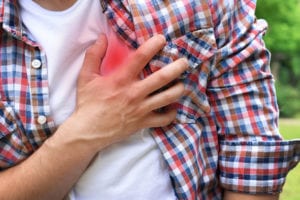Written by Joyce Smith, BS. Meta-analysis of cohort studies finds that insomnia is positively correlated with risk of heart attack and stroke.
 Previous studies have found that insomnia may contribute to metabolic syndrome 1, elevated inflammatory markers 2, depression 3, increased hypertension and cardiovascular disease 4. However, links between insomnia and heart attack and stroke have been inconsistent, demonstrating no association or an association only between certain symptoms of insomnia and cardio-cerebral events or only among women.
Previous studies have found that insomnia may contribute to metabolic syndrome 1, elevated inflammatory markers 2, depression 3, increased hypertension and cardiovascular disease 4. However, links between insomnia and heart attack and stroke have been inconsistent, demonstrating no association or an association only between certain symptoms of insomnia and cardio-cerebral events or only among women.
The study’s lead author, Qiao He, noted that adequate sleep is imperative for biological recovery. In fact, sleep consumes about one-third of the average human’s life. Unfortunately, the number of people with insomnia and sleep-related problems is increasing.
He et al chose this meta-analysis to investigate a potential association between symptoms of insomnia and the occurrence of heart attack and stroke. Participating subjects were required to have at least one of the following four symptoms of insomnia:
- DIS: Difficulty falling asleep 5 or initiating sleep 5
- DMS: Difficulty maintaining sleep 6, problems sleeping through the night 7, waking up during the night 8, frequent wakening 9 or lying awake most of the night 10
- EMA: early morning awakening. 5,6,11
- NRS: non-restorative sleep 6,8
They were also required to have had a cardio-cerebral vascular event including incidence of death due to acute myocardial infarct (AMI), coronary heart disease (CHD), heart failure (HF), stroke or combined events.
The study design was “prospective”, age>18years, mean or median follow up of more than 2 years, and with effect estimates such as relative risks, hazard ratios, and 95% confidence intervals.
This meta-analysis included 23 cohort studies with nearly 12,000 adverse events during a median follow-up ranging from three to 29.6 years.
Researchers found that “difficulty falling asleep” (DIS) and cardio-cerebral vascular events were significantly associated (P=0.001). People with “difficulty maintaining sleep” (DMS) and “non-restorative sleep” (NRS) were also associated with a higher risk of future cardio-cerebral vascular events, while the symptom of “early morning awakening” (EMA) showed no association.
Women with DIS, DMS and NRS demonstrated a higher risk of future cardio-cerebral vascular events then men. However, the risk difference between men and women was not statistically significant and authors HE et al could not unequivocally say that insomnia is more dangerous for women. Some previous studies have found no associations between insomnia symptoms and CVD death and AMI in men, only in women12. Women are biological different with respect to genetics, sex hormones, and reactions to stress, all of which may make them more vulnerable to insomnia as these studies have shown7. Future studies are needed to clarify the underlying mechanisms involved.
Limitations of this study were “self-reported symptoms” of insomnia and the fact that insomnia medication such as sleeping pills and continuous positive airway pressure were not included in the questions.
Source: He, Qiao, Peng Zhang, Guangxiao Li, Huixu Dai, and Jingpu Shi. “The association between insomnia symptoms and risk of cardio-cerebral vascular events: A meta-analysis of prospective cohort studies.” European Journal of Preventive Cardiology (2017): 2047487317702043.
© The European Society of Cardiology 2017
Posted September 18, 2017.
Joyce Smith, BS, is a degreed laboratory technologist. She received her bachelor of arts with a major in Chemistry and a minor in Biology from the University of Saskatchewan and her internship through the University of Saskatchewan College of Medicine and the Royal University Hospital in Saskatoon, Saskatchewan. She currently resides in Bloomingdale, IL.
References:
- Troxel WM, Buysse DJ, Matthews KA, et al. Sleep symptoms predict the development of the metabolic syndrome. Sleep. 2010;33(12):1633-1640.
- Irwin MR, Olmstead R, Carroll JE. Sleep disturbance, sleep duration, and inflammation: a systematic review and meta-analysis of cohort studies and experimental sleep deprivation. Biological psychiatry. 2016;80(1):40-52.
- Baglioni C, Battagliese G, Feige B, et al. Insomnia as a predictor of depression: a meta-analytic evaluation of longitudinal epidemiological studies. Journal of affective disorders. 2011;135(1):10-19.
- Meng L, Zheng Y, Hui R. The relationship of sleep duration and insomnia to risk of hypertension incidence: a meta-analysis of prospective cohort studies. Hypertension Research. 2013;36(11):985.
- Ingelsson E, Lind L, Ärnlöv J, Sundström J. Sleep disturbances independently predict heart failure in overweight middle‐aged men. European journal of heart failure. 2007;9(2):184-190.
- Li Y, Zhang X, Winkelman JW, et al. The association between insomnia symptoms and mortality: a prospective study of US men. Circulation. 2013:CIRCULATIONAHA. 113.004500.
- Helbig AK, Stöckl D, Heier M, Ladwig K-H, Meisinger C. Symptoms of insomnia and sleep duration and their association with incident strokes: findings from the population-based MONICA/KORA Augsburg cohort study. PloS one. 2015;10(7):e0134480.
- Canivet C, Nilsson PM, Lindeberg SI, Karasek R, Östergren P-O. Insomnia increases risk for cardiovascular events in women and in men with low socioeconomic status: a longitudinal, register-based study. Journal of psychosomatic research. 2014;76(4):292-299.
- Suzuki E, Yorifuji T, Ueshima K, et al. Sleep duration, sleep quality and cardiovascular disease mortality among the elderly: a population-based cohort study. Preventive medicine. 2009;49(2):135-141.
- Sofi F, Cesari F, Casini A, Macchi C, Abbate R, Gensini GF. Insomnia and risk of cardiovascular disease: a meta-analysis. European journal of preventive cardiology. 2014;21(1):57-64.
- Abe S, Ezaki O, Suzuki M. Medium-Chain Triglycerides in Combination with Leucine and Vitamin D Benefit Cognition in Frail Elderly Adults: A Randomized Controlled Trial. Journal of Nutritional Science and Vitaminology. 2017;63(2):133-140.
- Meisinger C, Heier M, Löwel H, Schneider A, Döring A. Sleep duration and sleep complaints and risk of myocardial infarction in middle-aged men and women from the general population: the MONICA/KORA Augsburg cohort study. Sleep. 2007;30(9):1121-1127.
